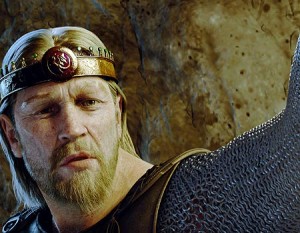When he arrived at the Danish land, Beowulf was a young man seeking adventure and glory. Beowulf was distinguished among his people, the Geats, for his bravery. As a young man Beowulf fought in many battles and as a result, showed his great character to others. Beowulf had many characteristics which helped him to succeed in battle. As a young man, Beowulf was known as the strongest man alive.
His strength allowed him to dominate in battle. If it were not for his pure strength, he would not have been able to defeat Grendel, for weapons would not work. By fighting Grendel without weapons, he opened himself up to greater glorification. Beowulf’s strength could not be seen as a disadvantage, while the results of his strength could.
Beowulf’s strength allowed him dominance in battle, but it also made him arrogant. While his arrogance allowed Beowulf to be sure of himself in battle, some of his peers found it to be a character flaw.
Ecglaf, in particular, saw Beowulf as cocky and vain, questioning, “Are you the Beowulf who competed with Breca…swollen with vanity…” So, while his cockiness was a flaw in the eyes of others, Beowulf saw it as self-assurance and used it to his advantage. Beowulf also had a strong spirit of adventure. His spirit of adventure was part of the reason that Beowulf went to fight Grendel. Beowulf’s strength and spirit of adventure had also led him to glory in many battles, including that with Grendel.
Beowulf used his glory in previous battles to justify himself when coming to help Hrothgar. In addition, his self-assurance, and known bravery probably guided his decision. Beowulf’s spirit of adventure gained him a lot of glories, however, it could have gotten him into trouble, if he were have taken an adventure too far. While at his young age, Beowulf used his strength for glory and recognition. As he became older his great strength was taken away from him, and Beowulf found himself without one of his greatest abilities.
Beowulf then was king of the Geats, and when a dragon attacked his land, it was his responsibility to protect his people. Feeling angry and eager for slaughter, Beowulf and his men went to slay the dragon. During the battle, Beowulf is overwhelmed by the force of the dragon due to his lack of strength and had to be saved by one of his thanes, Wiglaf.
Now, Beowulf’s strength, instead of being an advantage to him, became a weakness. The loss of strength and the battle was disheartening to Beowulf, however, he took it in stride. After his battle with the dragon, Beowulf realized his time was over. However, he used the time on his death bed to reflect on his life.
He also used this time to regain some glory, in reminding his thanes of all the great battles he fought. This is a sign of Beowulf’s self-assurance. Even though his assurance no longer guided him into battle, Beowulf used it to assure himself that he had done well in his life.
During his lifetime, Beowulf was a great fighter. His bravery and strength helped him to triumph, and he made sure everyone knew about it. By doing so he showed his vanity. However, all of his attributes; strength, courage, self-assurance, and adventurous helped Beowulf for good. While they could have had greater bad effects, Beowulf carried himself well and was respected by many (except for Grendel!).

